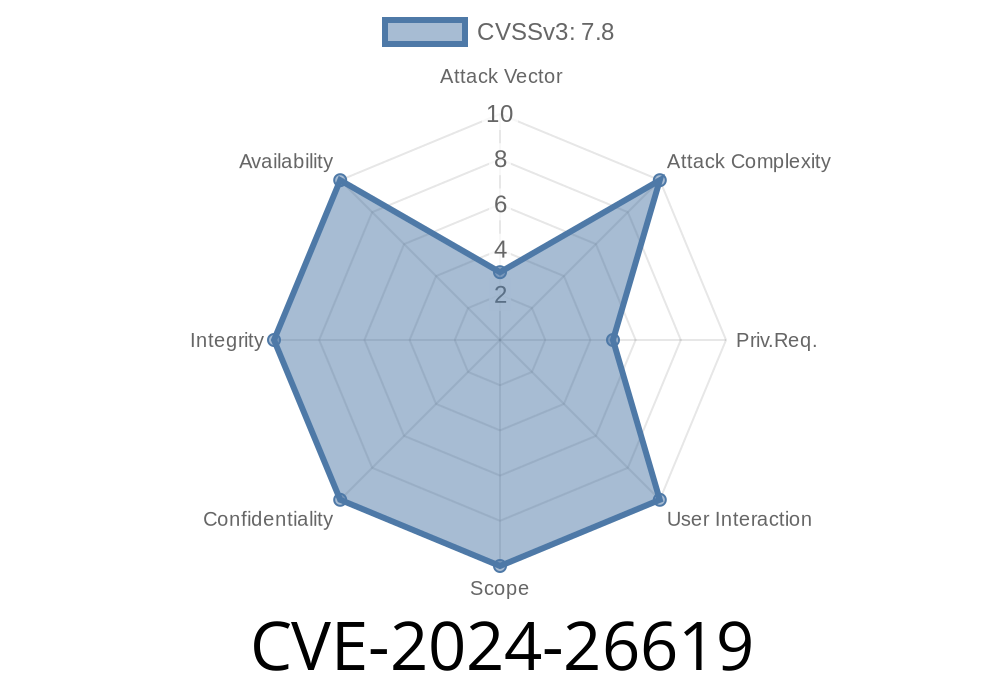The Linux kernel is the backbone of many devices and servers around the world. As it keeps growing, new features and architectures bring in fresh security challenges. In early 2024, CVE-2024-26619 came to light—an issue affecting the RISC-V architecture in the Linux kernel’s module loading logic. This post will cover what went wrong, how it was fixed, and how a possible exploit could look, all in simple terms.
What is CVE-2024-26619?
CVE-2024-26619 is a use-after-free vulnerability found in the Linux kernel code that manages kernel module loading on RISC-V systems. In simple language, "use-after-free" means the code tries to use memory after it’s already been released (freed), which can cause a crash or let an attacker gain control.
Fixed in: v6.9-rc1 and later
- CVE detail: nvd.nist.gov/vuln/detail/CVE-2024-26619
- Original fix: kernel.org commit 17cecd
What Caused the Vulnerability?
When loading a module, the kernel sometimes needs to free (release) several blocks of memory. In this case, the RISC-V code had two memory releases (kfree calls) done in the wrong order.
kfree(ptr1);
kfree(ptr2);
But if ptr1 depends on or contains ptr2, freeing ptr1 first will make ptr2 invalid, and then freeing ptr2 might cause a crash or a security vulnerability.
The Fix
The fix for CVE-2024-26619 was simple: reverse the order of the kfree calls.
Vulnerable Code (Before)
kfree(plt);
kfree(got);
Patched Code (After)
kfree(got);
kfree(plt);
By freeing got before plt, the kernel avoids trying to use memory that’s already been released.
Official commit diff:
git.kernel.org - riscv: Fix module loading free order
How Could an Attacker Exploit This?
A use-after-free can let an attacker run code with kernel (root) privilege if they can get precise timing. Here’s how someone might abuse CVE-2024-26619:
1. Trigger Module Load/Unload: The attacker loads and unloads kernel modules, triggering the buggy kfree logic.
2. Race Condition Abuse: By racing another operation, or rapidly loading/unloading, they try to use freed memory before the kernel properly reclaims it.
3. Heap Spray: Attacker might try to "spray" the kernel’s heap by allocating lots of objects, hoping their malicious data lands in the freed space.
4. Privilege Escalation: If successful, the attacker might hijack function pointers or overwrite critical data, letting them execute code as root.
Proof-Of-Concept (Simulated)
Simulating this bug is tricky without kernel development skills or actual exploit code. However, here's simple pseudocode expressing the vulnerability:
// Simplified: loading a kernel module triggers this in RISC-V code
struct module_arch {
void *plt;
void *got;
};
// On cleanup:
void cleanup_module(struct module_arch *mod_arch) {
// Vulnerable order
kfree(mod_arch->plt); // 'plt' points to area relying on 'got'
kfree(mod_arch->got); // Use-after-free risk if plt dereveloped got
}
// Patched order:
void cleanup_module_fixed(struct module_arch *mod_arch) {
kfree(mod_arch->got);
kfree(mod_arch->plt);
}
If the attacker can trigger a use of plt after it's been freed, and before freeing got, they might be able to inject data or cause a crash.
How to Protect Your Systems
- Update Your Kernel: All users of RISC-V Linux devices should immediately update to a kernel version including the fix (v6.9-rc1+ or distribution backports).
- Minimize Module Loads/Unloads: Only load necessary kernel modules.
- Monitor Logs: Watch for kernel panic or unusual module load/unload patterns.
- Apply Vendor Patches: Many Linux vendors have already released security updates addressing this CVE. Check your distribution’s advisories.
References and Further Reading
- CVE-2024-26619 at NVD
- Linux Kernel Patch Commit
- LKML Patch Discussion
Final Words
CVE-2024-26619 is a good example of how small mistakes in memory management can ripple into big security holes—especially in the kernel, where one bug can affect millions of devices. Keep your systems updated, and keep an eye out for new vulnerabilities in open source projects.
Timeline
Published on: 03/11/2024 18:15:19 UTC
Last modified on: 12/12/2024 15:19:41 UTC
